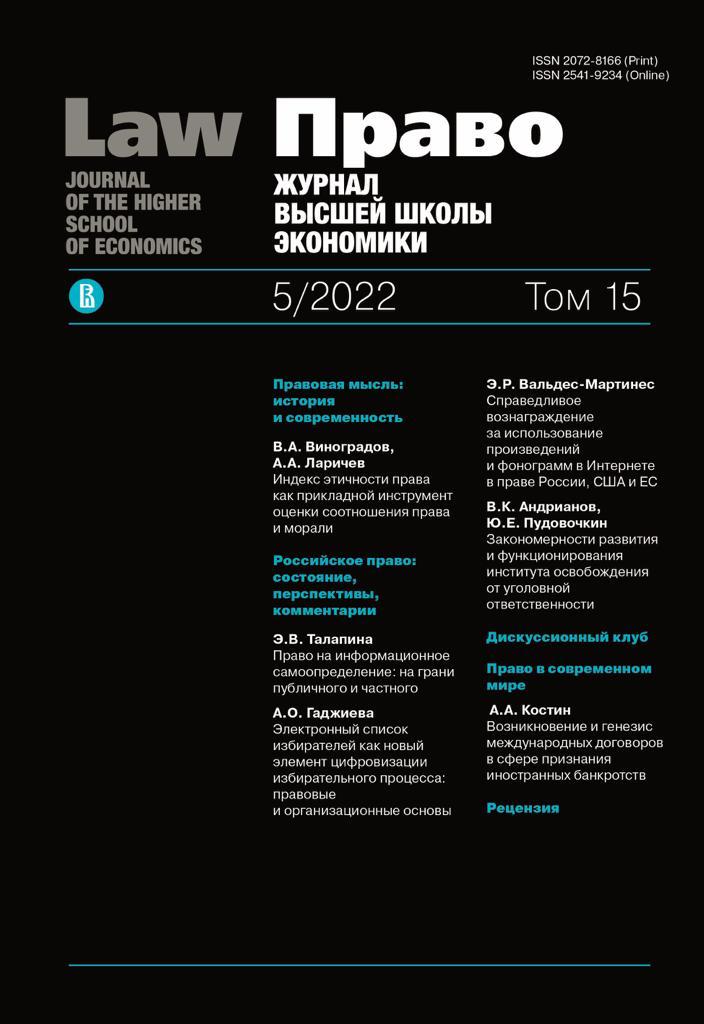Patterns of Development and Functioning Institute of Exemption from Criminal Liability
Abstract
The emergence, development and functioning of the institution of exemption from criminal liability is characterized by several patterns. Their identification and description is the key to understanding its essence, evolution and current state. Despite numerous studies on the institution of exemption from criminal liability, no attempt has been made yet to study its socio-legal nature through patterns, which necessitates the conduct of this study. The work is based on the theoretical doctrines on social, historical, and criminological conditions of criminal law and criminal policy that have become established in Russian science. The authors adhere to a dialectical view on the development of criminal law and its institutions, which involves the identification and study of the underlying contradictions of social and legal development. To study the laws of development and functioning of the institution of exemption from criminal liability, historical, statistical, analytical, and documentary methods are used. The paper identifies and analyzes the patterns of the institution of exemption from criminal liability, characterizing: the humanization of criminal law; the development of criminal law as a means of social management; the conditionality of the content of criminal law norms by social behavior of people; the dependence of the type of settlement of criminal conflict on the concept of the relationship between the state and the individual in society; the socio-historical genesis of the institution of exemption from responsibility; trends in the internal development of the institution of exemption from criminal liability and its functioning in practice. According to the results of the analysis, the authors conclude that the institution of exemption from criminal liability, which naturally emerged and develops as a humanistic response to the shortcomings and costs of criminal punishment, aimed at correcting lowrisk criminals and compensation for harm caused by a crime, now functions as a dialectic opposite of the legislative trend of increasing the scale of criminalization, an intrasystem criminal law mechanism to deter and overcome criminalization redundancy of the criminal law, which distorts its social and legal nature and purpose.References
Alikperov H.D. (1992) Crime and compromise. Baku: Elm, 193 p. (in Russ.)
Afanasova M.S. (2020) Compensation for damage from a crime: history and modernity (evolution of Russian legislation). Probely v rossiyskom zakonodatel'stve = Gaps in Russian Legislation, no. 5, pp. 200-204 (in Russ.)
Balafendiev A.M. (2016) Exemption from criminal liability in connection with positive post-criminal behavior: socio-legal prerequisites, essence and systematization of types. Candidate of Juridical Sciences Thesis. Kazan, 255 p. (in Russ.)
Bavsun M.V. (2002) Expediency in criminal law. Candidate of Juridical Sciences Thesis. Omsk, 186 p. (in Russ.)
Blagov E.V. (2018) The basis of exemption from criminal liability. Aktual'ny'e problémy rossiyskogo prava = Issues of Russian Law, no. 7, pp. 161-168 (in Russ.)
Burlakov V.N. (2011) Individualization of criminal punishment: law, theory, practice. Saint Petersburg: Juridical Center Press, 128 p. (in Russ.)
Chistyakov O.I. (ed.) (1986) Russian legislation of 10-20th ages. Moscow: Juridicheskaya literatura, vol. 1, 519 p. (in Russ.)
Egorov V.S. (2002) Theoretical aspects of exemption from criminal liability. Moscow: Social Institute Press, 279 p. (in Russ.)
Endoltseva A.V. (2005) Institute of exemption from criminal liability: theoretical, legislative and law enforcement aspects. Doctor of Juridical Sciences Thesis. Moscow, 396 p. (in Russ.)
Kaufman M.A. (2021) The basis of exemption from liability. Zhurnal rossiyskogo prava = Journal of Russian Law, no. 1, pp. 143-156 (in Russ.)
Kelina S.G. (1974) Theoretical issues of exemption from criminal liability. Moscow: Nauka, 231 p. (in Russ.)
Korobeev A.I. (2019) Russian criminal law policy: from genesis to crisis. Moscow: Yurlitinform, 352 p. (in Russ.)
Kostrova M.B. (2017) Criminal-legal mechanisms of compensatory nature as one of the trends of modern economically oriented criminal policy of Russia. Ugolovnoe pravo = Criminal Law, no. 4, pp. 73-79 (in Russ.)
Lopashenko N.A. (2009) Criminal policy. Moscow: Wolters Kluwer, 579 p. (in Russ.)
Matveeva Ya. M. (2015) Institute of exemption from criminal liability in Russian criminal law: modernization and search for alternative ways to resolve a criminal law conflict. Candidate of Juridical Sciences Thesis. Saint Petersburg, 220 p. (in Russ.)
Nazarenko G.V. (2012) Criminal law policy: trends and prospects. Srednerusskiy vestnik obshhestvennyh nauk = Central Russia Bulletin of Social Sciences, no. 3, pp. 156159 (in Russ.)
Pashin S.A. (2016) Draft of amendments to Criminal Code and Code of Criminal Procedure to provide victim, suspect, accused with possibility of reconciliation. Precedenty i pozicii = Precedents and Positions, no. 5, pp. 15-21 (in Russ.)
Poniatovskaya T.G. (2015) Do the conditions of exemption from criminal liability need formal signs? Obshhestvo i pravo = Society and Law, no 4, pp. 93-98 (in Russ.)
Rarog A.I. (2014) Repressive inclination of Russian criminal policy. Kriminologicheskij zhurnal Baikal'skogo gosudarstvennogo universiteta e'konomiki i prava = Criminology Journal of Baikal State University of Economics and Law, no. 3, pp. 88-95 (in Russ.)
Senina E.N. (2022) Mediation and restorative approach in resolving criminal law conflicts. Vestnik RUDN = RUDN Bulletin, no. 2, pp. 464-484 (in Russ.)
Smirnov A.M. (2018) On the question of excessive humanism of the Russian criminal policy. Obrazovanie i nauka v Rossii i za rubezhom = Education and Science in Russia and abroad, no. 11, pp. 310-314 (in Russ.)
Sundurov F.R. (2012) Exemption from criminal liability in the system of measures of criminal legal impact. Vestnik TISBI = Bulletin of TISBI, no. 2, pp. 152-158 (in Russ.)
Zvecharovsky I.E., Ivanov A.L. (2015) Exemption from criminal liability. Ugolovnoe pravo = Criminal Law, no. 4, pp. 13-18 (in Russ.)
Copyright (c) 2022 Law Journal of the Higher School of Economics

This work is licensed under a Creative Commons Attribution-ShareAlike 4.0 International License.





